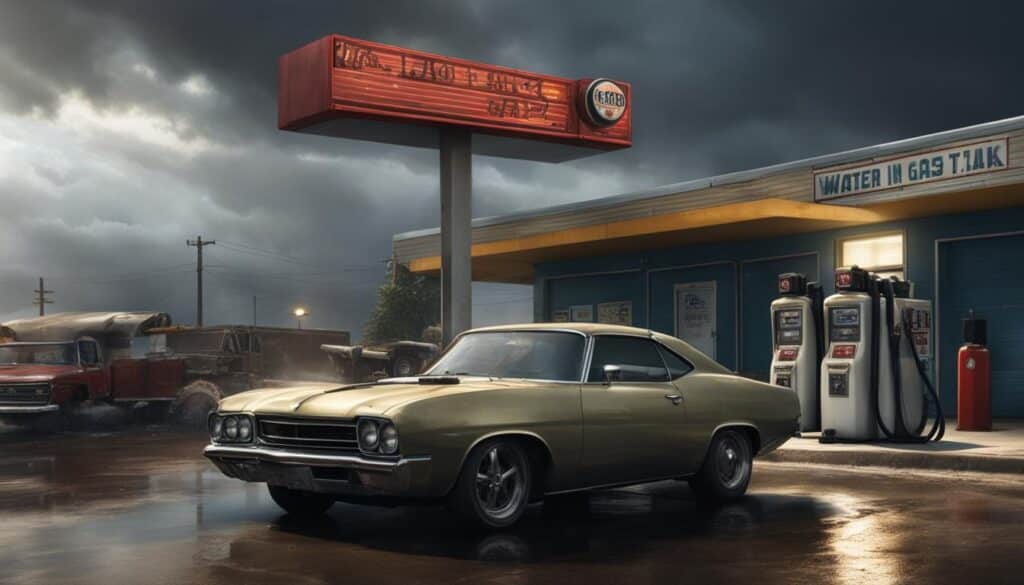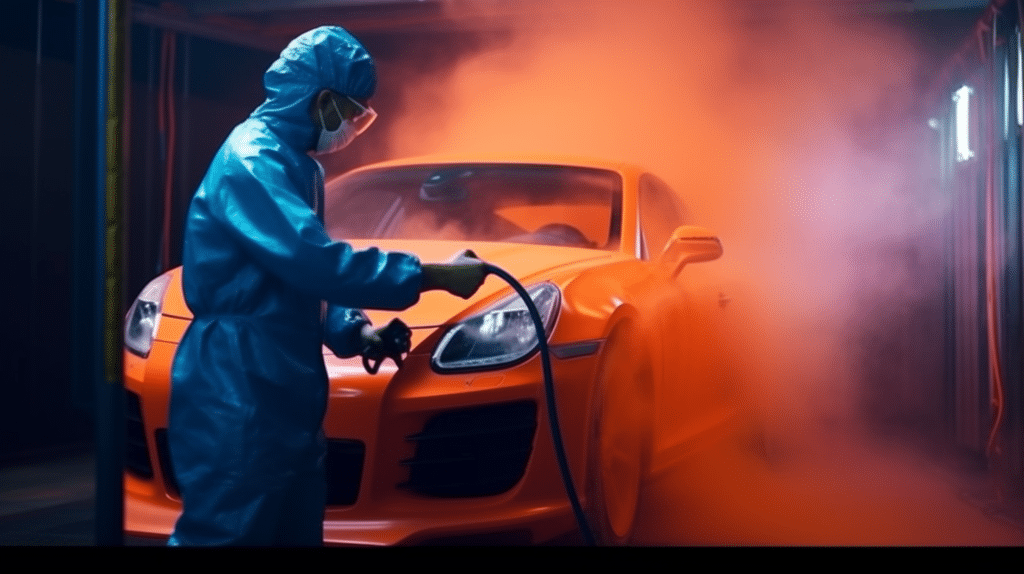As a vehicle owner, you know that there are several things that can go wrong with your car, but have you ever considered the effects of water in your gas tank? Water can have several consequences that can damage your gas tank and even your car engine, leading to potential issues with vehicle performance. It is essential to understand these consequences and the impact they can have on your car’s overall performance.
Water in your gas tank can get into your car’s fuel system and cause significant damage. It can also cause your vehicle to malfunction in various ways, leading to costly repairs. Recognizing the symptoms and addressing the issue quickly can save you time and money in the long run.
Key Takeaways
- Water in your gas tank can cause several consequences, including damage to the gas tank and car engine.
- It is important to understand the symptoms of water in your gas tank to avoid potential damage to your vehicle.
- Water-contaminated gasoline can cause significant problems in the fuel injectors and other components of the fuel system.
- Preventative measures can help you avoid water contamination in your gas tank.
- It is essential to know how to remove water from your gas tank to prevent potential damage to your vehicle.
Effects of Water in Your Fuel System
Water in your fuel system can have significant effects on your vehicle’s performance and longevity. When water enters your fuel tank, it can contaminate the gasoline, leading to issues with fuel injectors and other components of the fuel system.
Water-contaminated gasoline can lead to corrosion and damage to fuel injectors, which are responsible for delivering fuel to the engine. Over time, this damage can cause engine misfires, stalling, or even complete failure.
Here are some of the potential effects of water in your fuel system:
| Effect | Description |
|---|---|
| Clogging of Fuel Injectors | Water can cause fuel injectors to become clogged or damaged, reducing fuel flow to the engine and affecting its performance. |
| Rust and Corrosion | Water in the fuel system can cause rust and corrosion to the metal components of the fuel tank and fuel lines, leading to leaks and deteriorating the fuel system over time. |
| Reduced Fuel Efficiency | Water-contaminated gasoline can reduce fuel efficiency by affecting fuel combustion, leading to higher fuel consumption and decreased mileage. |
| Engine Misfires | Water in the fuel system can cause engine misfires, which can cause rough idling, hesitation during acceleration, and a general reduction in engine performance. |
Water damage to fuel injectors is a particular concern, as it can cause long-term damage to your engine’s performance and lifespan. To avoid these issues, it’s essential to take preventative measures to keep water out of your fuel system.
In the next section, we’ll discuss the symptoms that may indicate the presence of water in your gas tank.
Symptoms of Water in Your Gas Tank
As a driver, it’s crucial to be aware of the symptoms that may indicate the presence of water in your gas tank. Early detection of water contamination can prevent potential damage to your vehicle and avoid costly repairs. Here are some common signs to look out for:
- Difficulty starting the engine
- Rough idling or stalling
- Hesitation during acceleration
- Reduced fuel efficiency
- Unusual engine noises
If you experience any of these symptoms, it’s essential to address the issue immediately. Delaying repairs could result in further damage to your vehicle and increased repair costs.
Additionally, it’s crucial to inspect your gas tank and fuel system regularly for any signs of water infiltration. If you notice any damage or corrosion, seek professional assistance to address the issue promptly.
Tip: Keep in mind that water in your gas tank can mimic other common car problems. If you’re unsure whether water contamination is the issue, consult with a mechanic or specialist to diagnose the problem accurately.
Potential Damage to Your Vehicle
Allowing water to remain in your gas tank can lead to serious damage to your vehicle. The car engine is particularly vulnerable to water contamination, as it can infiltrate the engine and cause corrosion. This can lead to mechanical problems and potential engine failure.
Water can also damage the fuel injectors, which are responsible for delivering fuel to the engine. If the injectors become clogged or damaged, they may no longer be able to perform their intended function, leading to engine misfires or stalling. This can be a very costly repair, making prevention and early detection key.
Preventing Water Damage to Your Gas Tank and Engine
The best way to prevent water damage to your gas tank and engine is to take preventative steps. This can include using a water separator when filling up at the gas station, as well as avoiding filling up during rainstorms or other inclement weather. It is also important to regularly inspect your fuel system for any signs of water infiltration, such as water droplets or rust on the fuel cap or the exterior of the fuel tank.
What to Do if You Suspect Water in Your Gas Tank
If you suspect that water has infiltrated your gas tank, it is important to take action immediately. One option is to use a fuel additive specifically designed to address water contamination. These additives work by separating the water from the gasoline, allowing it to be safely removed from the fuel system.
If the contamination is severe, it may be necessary to drain the entire fuel tank and replace it with fresh gasoline. This may require professional assistance, as it can be a complex and potentially dangerous process. Taking quick action and seeking professional help when needed can help prevent further damage to your vehicle.
Tip: If you have experienced water damage to your vehicle in the past, consider investing in comprehensive car insurance that covers water damage and other types of damage that may occur as a result of weather or environmental factors.
Preventing Water in Your Gas Tank
Preventing water contamination in your gas tank is essential to maintain your vehicle’s performance and avoid potential damage. Here are some tips to help you keep your fuel system free from water:
Use a Water Separator
A water separator is a simple and effective device that removes water from your fuel before it enters your gas tank. It works by filtering the fuel, separating the water from the gasoline, and diverting it away from your engine. Consider installing a water separator if you frequently drive in wet or humid conditions.
Avoid Filling Up During Rainstorms
When filling up your gas tank during a rainstorm, water can easily find its way into the fuel system, leading to potential damage. If possible, avoid filling up during or immediately after a rainstorm. Instead, wait until the weather clears up before heading to the gas station.
Regularly Inspect Your Fuel System
Regularly inspect your fuel system for signs of water infiltration. This includes checking for rust, corrosion, or moisture in your gas tank or fuel lines. If you suspect water contamination, take the necessary steps to remove it as soon as possible to avoid potential damage to your vehicle.
By following these simple preventative measures, you can help ensure a smooth-running vehicle and avoid costly repairs due to gas tank water damage.
Removing Water from Your Gas Tank
If your gas tank has been contaminated with water, you may be wondering how to remove it. Here are some methods you can try:
- Fuel additives: There are fuel additives available in the market that are specifically designed to remove water from your gas tank. Simply add the recommended amount of the product to your fuel tank, and it will work to absorb the water and allow it to be burned off through the engine. These additives can be found at most auto parts stores and are easy to use.
- Draining the tank: If the water contamination is severe, you may need to drain the entire tank. This can be done by removing the fuel pump and draining the tank from the bottom. However, this should only be done by a professional mechanic, as it requires specialized tools and experience to avoid damaging the fuel tank or fuel system.
- Professional assistance: If you are unsure how to remove the water from your gas tank or if the contamination is severe, it is best to seek professional assistance. A qualified mechanic can properly diagnose the problem and perform the necessary repairs to get your vehicle back on the road.
It is important to address the issue of water in your gas tank as soon as possible to avoid further damage to your vehicle.
Tip: To prevent future water contamination, be sure to fill up your tank during dry weather and use a high-quality fuel filter. Regularly inspect your fuel system for any signs of water infiltration.
Tips for Dealing with Water in Your Gas Tank
If you suspect that your gas tank has water contamination, there are a few steps you can take to mitigate damage to your vehicle.
Do not start your engine
If you suspect water in your gas tank, do not start your engine. Doing so can cause more damage to your vehicle’s fuel system and engine. Instead, have your car towed to a mechanic or remove the water if you know how to do so safely.
Inspect your gas tank
Inspect your gas tank for signs of water contamination, such as a white or rust-colored film on the inside of the tank. If you see any signs of water, it’s best to drain the tank and replace the fuel filter before refilling with fresh gasoline.
Use a fuel additive
You can add a fuel additive specifically designed to address water contamination in your gas tank. These additives work by breaking down any water molecules and allowing them to mix with the gasoline, which can then be safely burned off by the engine. Be sure to follow the manufacturer’s instructions when using these products.
Seek professional assistance
If you are unsure how to remove water from your gas tank safely, or if you suspect that water has caused damage to your vehicle, it’s best to seek professional assistance from a mechanic or auto repair shop. They have the expertise and equipment necessary to safely remove water from your gas tank and address any related damage.
Prevent future water contamination
Prevention is key when it comes to water contamination in your gas tank. To avoid gas tank water damage and potential engine issues, regularly inspect your fuel system for signs of water infiltration, avoid filling up during rainstorms, and use a water separator if possible.
By following these tips, you can deal with water in your gas tank effectively and prevent potential damage to your vehicle.
Conclusion
As we’ve explored throughout this article, having water in your gas tank can wreak havoc on your vehicle’s performance and potentially cause costly damage. However, there are ways to prevent water contamination and mitigate its effects should it occur.
By taking preventative measures such as using a water separator and being mindful of filling up during rainstorms, you can reduce the likelihood of water infiltrating your gas tank. Regularly inspecting your fuel system for any signs of water contamination can also help catch any issues early on.
If you do suspect water in your gas tank, it’s important to take action as soon as possible. This may include using fuel additives designed to address water contamination, draining the tank, or seeking professional assistance if necessary.
Remember, staying vigilant and taking proper measures can help keep your vehicle running smoothly and avoid the headaches and expenses associated with gas tank water damage.
FAQ
What are the consequences of water in your gas tank?
Water in your gas tank can cause various problems, such as damage to the gas tank itself and the car engine. It can lead to issues with vehicle performance and may require repairs to fix the damage.
What are the effects of water in your fuel system?
Water in your fuel system can contaminate the gasoline, leading to problems with the fuel injectors and other components. This can result in engine misfires, stalling, and decreased overall performance.
What are the symptoms of water in your gas tank?
Some common symptoms of water in your gas tank include rough idling, reduced fuel efficiency, difficulty starting the engine, and hesitation during acceleration. If you notice any of these signs, it’s important to address the issue promptly.
What potential damage can water in your gas tank cause?
Water in your gas tank can infiltrate the car engine, leading to corrosion and potential engine failures. It can also damage the fuel injectors, causing them to become clogged or malfunction.
How can you prevent water in your gas tank?
To prevent water contamination in your gas tank, you should consider using a water separator, avoid filling up during rainstorms, and regularly inspect your fuel system for any signs of water infiltration. These preventative measures can help keep your gas tank water-free.
How can you remove water from your gas tank?
There are several methods for removing water from your gas tank. You can use fuel additives specifically designed to address water contamination, drain the tank completely, or seek professional assistance if necessary. The appropriate method will depend on the severity of the water contamination.
What tips can help in dealing with water in your gas tank?
If you suspect water contamination in your gas tank, it’s important to address the issue promptly. Some tips for dealing with water in your gas tank include monitoring the symptoms, taking immediate action to remove the water, and minimizing potential damage to your vehicle by seeking professional help if needed.




